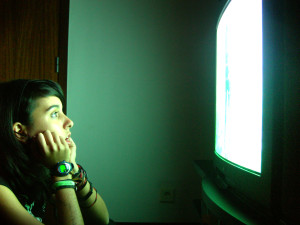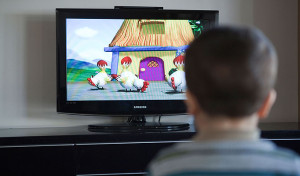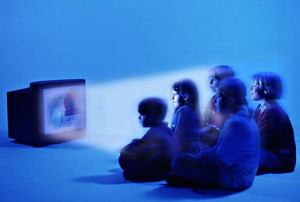How to prevent Television addiction in Children
posted by: Contributor
No Comments »
When a child has an uncanny love for the television and they would gladly put away productive tasks to spend more screen time, they might be dealing with addiction. Therefore, it is important to set measures in place to help your child deal with Television addiction and prevent it in the future.
Create a schedule for them
When children are given the free will to do anything they want, they end up misusing it. This is not their fault because they are behaving based on their age and level of understanding.

You need to create a schedule that involves all important activities. With this schedule, they won’t be able to exceed their TV time.
Watch programs together
Parents and caregivers need to create ample time to watch TV with their kids. This gives you the first-hand experience of the programs they like to watch. You will be able to guide them on what they are watching.
Reduce TV time during school periods
You should not allow your children to prioritize TV time when they are supposed to be in school.
Similarly, when they return from school, their first task should be to eat, relax and do some academic work. Later that day, they can be allowed to watch the TV after they’ve performed the needed tasks.
Set limits for them
Your child should not be allowed to watch TV for as long as they want even if it is the holidays. It would affect their concentration level, and their productivity at home and in school might drop.
When children realize that some limits should not be exceeded, they will abide by them, and it helps them in the long run.
Television addiction is one of the underrated forms of behavioral addiction that parents are unaware of. However, you can curb this in your children by setting boundaries and limits. Endeavor to watch programs together and choose the media they should watch when they are alone.
NEGATIVE EFFECTS OF TV ON MENTAL HEALTH
posted by: Contributor
No Comments »
Watching the television is one of the profound ways to relax after a stressful day. However, there are some negative effects that come with watching TV particularly when it comes to the mental health.
Below are some negative effects of the television on your mental health
- Your symptoms become worse: When you are watching the TV with rapt attention, you might not be aware of the effects on your mental health. If there is a struggle of any symptom you feel within you, then the TV show airing at that moment has an effect on your mental health.
For instance, if you are someone who fears a lot, it would do you much good to avoid horror movies.
- You keep replaying disturbing scenes in the movie: There are some movies or shows that contain distressing content, and it might be difficult for you to take your mind off it. Such movies have the capacity to negatively impair your mental health, so it is important to avoid such movies or shows, and focus on others that have a lighter atmosphere.
- Triggering of old memories: Everyone has gone through unpleasant times and there are periods when we are reminded of them. Sometimes, seeing some content on TV might remind you of them. Hence, by all means possible, it is expedient to avoid such content on the TV because they give you a negative flashback.
- Encourage isolation: If you watch TV shows and all you are encouraged to do is to isolate yourself, then there is a tendency for your mental health to be affected. Good TV shows are intended to promote social interaction and this is what you need to keep your mental health in check.
- TV addiction: If you are addicted to the TV, then your mental health has been affected. There are high tendencies that you would not be fully productive and your performance would be on a low ebb.
It is important to exercise discipline and self-restraint if you discover that the TV is affecting important aspects of your life.
HOW TO HELP YOUR CHILDREN IN THIS TECHNOLOGY AGE
posted by: Contributor
No Comments »
As years pass by, people become more immersed in the world of technology. One would wonder why a child of five years is able to handle a mobile phone. When, around two decades ago, a child of five years could not dream of accessing a mobile phone.
In this age, all aspects of our lives have a high input of technology, particularly education. In most schools today, children are required to access the internet for information. Some of them use their mobile devices to create fun for themselves by playing games and the likes.
If parents are not careful, their children would become totally submerged in technology and it would be hard to get them out. This situation is akin to internet or computer addiction.
So, as parents, it is important to implement moderation in the use of these devices. If possible, you can create a schedule for your children to use their mobile devices and the internet. This is great in ensuring that they focus on other productive tasks.
Too much screen time has an adverse effect on kids and this should not be encouraged. As a matter of fact, using a mobile device and eating alongside promotes obesity and other related health factors.
For some social media platforms, there is a minimum age requirement for joining. This is to discourage toddlers who are not matured from using the internet. They might be exposed to sensitive content that is not healthy for their minds.
One easy way to know children who are exposed to sensitive content, is by the way they talk and act. There are common words and behaviors that are on the internet, and if children are exposed to them, they begin to copy.
At first, children might want to resist your disciplinary measures. But by all means possible, it is important to explain to them the reason for doing so.
Eventually, your children would grow up and be grateful to you for doing so.
GADGET ADDICTION AMONG CHILDREN
posted by: Contributor
No Comments »
It can be said that the current technological boom has taken us far into the future. However, it can be said that it has also been a source of problem among us, particularly children. Irrespective of the fact that they have made our lives easier in a whole lot of ways, and we have to depend on them for a whole lot of things, they have also made our lives unbearable in some certain ways.
Gadgets affect the way we think, and changes our perception about life in a whole lot of ways. More can be said about children, as the effect which it has on them is very profound. Children who belong to this generation, can be said to be smarter and more active than we. Hence, you can expect that they would be more inquisitive as to how different things work. So, you can expect that what took us a year to learn, could be figured out by children of these days in just few months.
These children are on a regular basis, exposed to the media world and they come in touch with its constituents every now and then. The sudden technological change which is currently occurring has affected their thought pattern and it has influenced them greatly.
Starting off with smartphones, they have become a tool which ensures that children remain quiet and gentle without causing any form of disturbance. However, if care is not taken, it has a tendency to make them addicted, whereby they would not be able to do anything productive. Rather, they would be on the phone all day.
Furthermore, the older children are more at risk. A good number of them find it hard to perform well at school because they are addicted to their smartphones. They operate and surf the web on their phones all through the night, and catch little sleep. The next morning at school, they are docile and quite unresponsive.
Those who have personal computers among them have their own form of addiction. They see movies and play video games, and it gets to a point where they cannot do without it, and they always look forward to it.
It is advised that parents employ strict measures in ensuring that their children are not addicted to gadgets which are common in today’s use.
DEMERITS OF TELEVISION ADDICTION
posted by: Contributor
No Comments »
Some people are of the opinion that Television is the etymology of everything that is bad, they also claimed that the Television has contributed largely to evil which exists in our society today. However, others believe that that opinion is flawed. They see the television as a means of getting enriched and enlightened with ample understanding.
There are some people who cannot do without the Television. Immediately they get home from work or school, they switch on the Television, and start watching, instead of resting or having a meal. It gets worse when these set of people spend long hours in front of the Television without doing anything productive.
This is the category of people who would make individuals think that the Television has done more harm than good. Television addiction is a compulsive disorder in which an individual finds it very difficult to stay away from the Television, thereby spending very long hours instead of doing other beneficial tasks.
With time, this excessive love for the Television begins to affect integral aspects of their lives, as they become less productive in their work because they do not get enough hours of sleep, it also affects their relationship with their friends and family because they do not have time for them.
The points listed below are common disadvantages of Television addiction:
- Crime, violence and sex are usually shown on the Television, and they have adverse effects on people who frequently watch them, particularly children. It is more likely for children to respond and carry out what they watch than adults. Hence, it is important that parents know what their children watch on the Television.
- Also, watching the Television excessively has an adverse effect on your health. Research has shown that there is a strong link between obesity and watching the television. As mentioned earlier, you would be unable to sleep well because you spend more time watching the Television.
- Spending much hours watching the Television is a waste of time, as you would not be able to do anything important. Eventually, you would discover that you pile up tasks, and you would not be able to complete them at the scheduled time.
- In addition to this, it also impairs the relationship between you and those around you.
Self Image
posted by: Guest
No Comments »
 Many people do not realize that television shapes our perceptions of ourselves and effects our self image drastically. People of all age groups see their demographic represented on television and unconsciously begin comparing themselves to the characters and figures they see on TV. People are only able to separate entertainment from reality to a certain degree, but emotionally, people tend to react to what they see on TV as if it were real. This works through a psychological process that television producers and creators are aware of.
Many people do not realize that television shapes our perceptions of ourselves and effects our self image drastically. People of all age groups see their demographic represented on television and unconsciously begin comparing themselves to the characters and figures they see on TV. People are only able to separate entertainment from reality to a certain degree, but emotionally, people tend to react to what they see on TV as if it were real. This works through a psychological process that television producers and creators are aware of.
Creators of television shows and commercials deliberately create prototypical images of people through characters and representations. These portrayals of people are more attractive, more well spoken and lead more interesting lives than the average person. Television audiences are aware of this frame of TV marketing to a certain degree, but psychologically, they are still affected by observing portrayals of people who lead prettier, more interesting lives than themselves.
People process these portrayals by comparing themselves to the characters they see on TV. Television shows and commercials give people the notion that somehow they are not up to par because they do not look, talk or act like the characters they enjoy on TV. They become wistful and longing to be more impressive so that their lives can resemble that of a TV character.
This way of thinking leads to self image problems. People become dissatisfied with their lives and live in a constant state of self criticism when they are always comparing themselves to TV characters. They become anxious at the thought that their lives will never be as impressive as the characters they see on TV and develop a very negative way of thinking about themselves. For the sake of good mental health, this trend needs to be reversed. Many social scientists believe that media literacy is the answer. This means people as a whole need to become more practiced at digesting their TV diet with an appropriate amount of criticism.
Addiction
posted by: Guest
No Comments »
 Television addiction is a real and well documented thing. The term “addiction” can apply to anything that one does compulsively and excessively. Since the creation of television, people have been watching it compulsively and excessively. People who are addicted to their televisions devote their valuable personal resources to TV watching, replace other things of value in their lives with TV watching and exhibit inappropriate emotion when prevented from watching TV. You can identify a TV addict by their revealing traits:
Television addiction is a real and well documented thing. The term “addiction” can apply to anything that one does compulsively and excessively. Since the creation of television, people have been watching it compulsively and excessively. People who are addicted to their televisions devote their valuable personal resources to TV watching, replace other things of value in their lives with TV watching and exhibit inappropriate emotion when prevented from watching TV. You can identify a TV addict by their revealing traits:
- A television addict will have inappropriate emotional reactions when they are prevented from watching TV. Any addict turns to their addiction as a means of escapism. Their addiction represents a way to shut the world out and release stress. Everyone needs to do this in a recreational way, but when a person becomes so dependent on television that they cannot stop themselves from indulging in it, they have become addicted.
- A television addict will also replace their socializing, relationships, hobbies and responsibilities with television watching. This is another tell tale sign of any addict. Addiction infects a person’s thinking and convinces them that there is nothing more important in the world than engaging in their addiction. A TV addict will go as far as ignoring their family, friends, job, school and health in order to engage in their TV watching.
- Lastly, a television addict invests themselves into TV watching in every way a person can invest themselves, including their time, money, energy and affection. They prioritize their TV watching over every other activity and sacrifice their resources to accomplish their excessive TV watching.
Television addiction is not accidental. It is carefully orchestrated by TV producers, writers and directors. Television shows and commercials are a commodity of their own, and whoever keeps audiences returning is selling their commodity most effectively. If you or someone you care about is a TV addict, it is wise to join a support group or seek counseling. TV addiction can be overcome, but it takes work and effort.
Attention Span
posted by: Guest
No Comments »
 Asking whether short attention spans came first or whether short television content came first is sort of like opening the “chicken and the egg” question. It is likely not an accident that cases of ADHD became prominent at the same time observations on how short television entertainment and commercials are began to emerge. Television is not alone in its guilt of this trend. Reading material, radio programs and advertisements all follow the same model of being brief, full of transitions and catchy. This is done deliberately to engage short attention spans, but what has taken place due to this media construct is the promotion of short attention spans.
Asking whether short attention spans came first or whether short television content came first is sort of like opening the “chicken and the egg” question. It is likely not an accident that cases of ADHD became prominent at the same time observations on how short television entertainment and commercials are began to emerge. Television is not alone in its guilt of this trend. Reading material, radio programs and advertisements all follow the same model of being brief, full of transitions and catchy. This is done deliberately to engage short attention spans, but what has taken place due to this media construct is the promotion of short attention spans.
On one hand, television and media creators are responsible for encouraging this trend. After all, they tailor their brands of entertainment to short attention spans in order to captivate a broad audience. This not only validates those who naturally have a short attention span, but it also cultivates a short attention span in people who would otherwise be able to engage for significant periods of time. This is largely the equivalent of the fast food industry. Ultimately, people are responsible for the quality of their own food and media diet, but when the industry is deliberately trying to pull people in and prey on their cravings, they are not meeting their ethical responsibility.
On the other hand, the television industry has offered us a media diet to suit cravings that were already in existence. A majority of the television viewing demographic was exposed to enough education to know the basic difference between quality media and junk media, yet a majority of the television viewing population still chooses television content that was created for short attention spans. This craving for simplistic, unintelligent media is one that responsible people make the effort to control and irresponsible people indulge in. We, as the television audience, play a responsible role in dictating to the television industry what our media diet will be.
Hypnotic Effects
posted by: Guest
No Comments »
 The hypnotic effects of television watching have been documented by a number of sources. TV has a lull and a repetition to it that leads many people to feel under its spell. TV show creators and commercial producers are aware of these affects. In fact, they try their hardest to harness the power of these effects to make people addicted to their viewing product so that they will return for more. The hypnotic power of what we view on TV is made up of several elements.
The hypnotic effects of television watching have been documented by a number of sources. TV has a lull and a repetition to it that leads many people to feel under its spell. TV show creators and commercial producers are aware of these affects. In fact, they try their hardest to harness the power of these effects to make people addicted to their viewing product so that they will return for more. The hypnotic power of what we view on TV is made up of several elements.
Firstly, the sensory experience created by TV watching is crafted with the intention of drawing people in. TV producers use attractive colors to capture the focus of the eye. They create a soundscape that will be memorable and will repeat in a person’s mind throughout their day. The content is not challenging and is served in brief doses so as not to lose short attention spans. The whole of the TV viewing experience is designed to be immersive and hypnotic. It does take a developed skill set to market a TV viewing experience, but the amount of marketing that goes into it is purely for the purpose of making people addicted.
Secondly, TV producers create entertaining content to be delivered in their shows and commercials. This content is meant to entertain, enlighten and inform viewers in order to inspire them to return to watch more. The content may be comedic or dramatic in nature. The content is delivered through the writing, acting, directing and other on screen elements that compose the dialogue and spectacle of the show or commercial. There can be genuine art form to this content creation, but TV producers are always first and foremost focused on hooking their audience.
And lastly, the pacing of shows and commercials does not reflect reality so much as it reflects the kind of entertainment people and their attention spans crave.TV producers know that TV marketed to short attention spans will hold people’s interest longer and hook their viewing audience over and over again. All of these elements combined create an entertainment experience that has a hypnotic effect on the average viewer, which makes them a repeat viewer.
- « Previous
- 1
- 2

